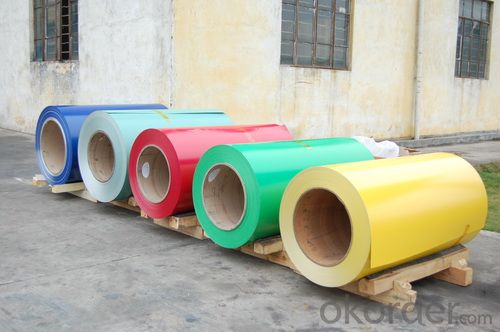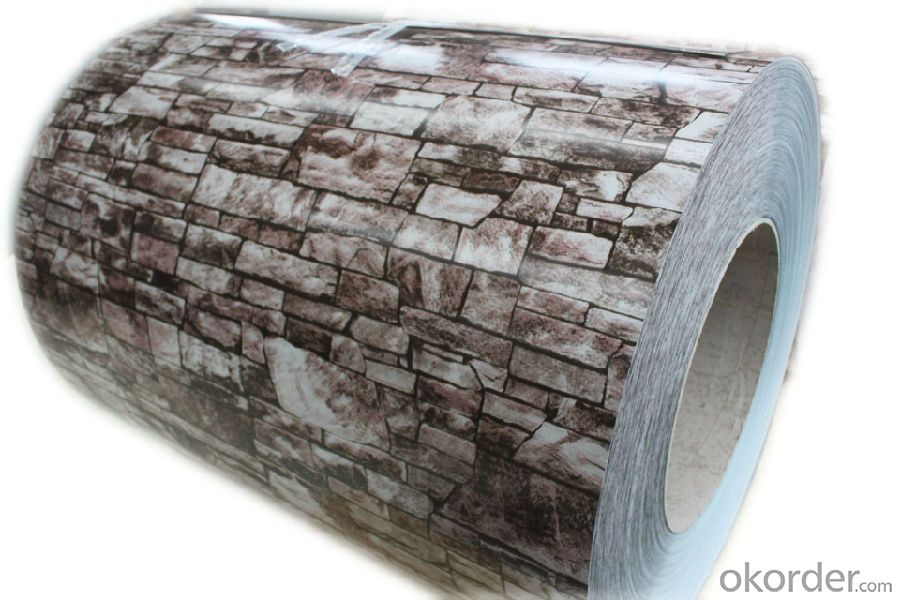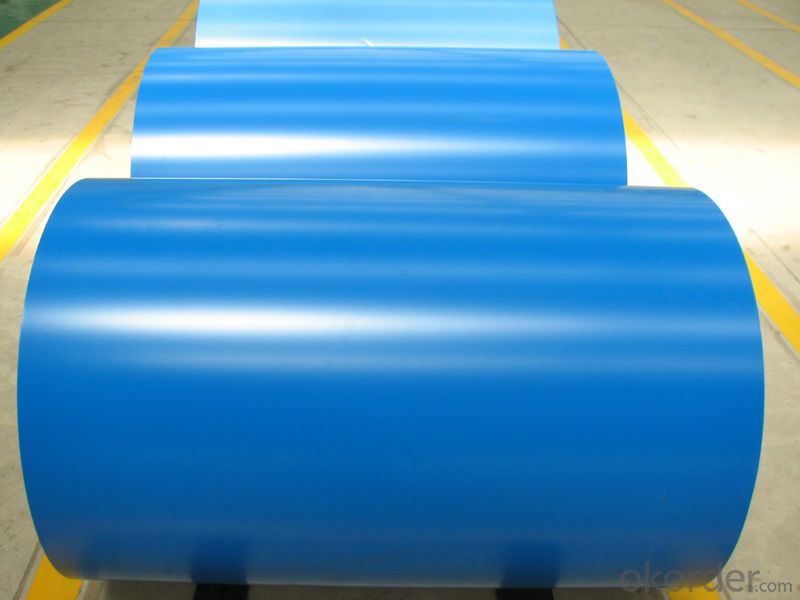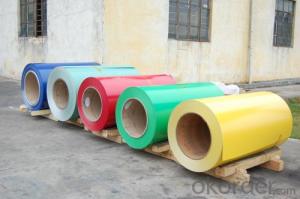Prime Z40 Coating Color Aluminum Coil with High Quality
- Loading Port:
- Shanghai
- Payment Terms:
- TT OR LC
- Min Order Qty:
- 5 m.t.
- Supply Capability:
- 10000 m.t./month
OKorder Service Pledge
OKorder Financial Service
You Might Also Like
Item specifice
1. Specification of Prime Z40 Coating Color Aluminum Coil with High Quality
Material | Alloy Aluminum 6063,6061,6005 or customer nominated |
Temper | T3, T4, T5, T6 |
Surface | Anodize, electrophoresis, powder coating, PVDF coating, wood grain painting, matted, etc. |
Colour | Any colour based on Standard Germany RAL Mark |
Length | Coating 6.5 meters, Anodizing 6.5 meters, Mill finish 5 meters |
Press Machine | 500-4000 tons all together 64 press lines. |
Fabrication | 1. Windows and doors; 2. Drilling; 3. Bending; 4. Cutting; 5. etc. |
Certificate | ISO 9001 |
Moulding | 1. Using our moulds, no fee; |
2. Using customer drawing, opening mould, usually about 10~50 tons then the moulding can be refunded. | |
3. Mould cost is negotiable base on the order quantity | |
Capability | Annual output 100,000 tons |
2. Application of Prime Z40 Coating Color Aluminum Coil with High Quality
(1).Interior: wall cladding, ceilings, bathrooms, kitchens and balconies, shutters, doors...
(2).Exterior: wall cladding, facades, roofing, canopies, tunnels,column covers , renovations...
(3).Advertisement: display platforms, signboards, fascia, shop fronts...
3. Feature of Prime Z40 Coating Color Aluminum Coil with High Quality
*Such coil is specially designed to replace aluminum ingot, due to the high export tax of aluminum ingot, the coil has better price than ingot.
*This type of coil can fit customer's remelting furnace just like ingot, no need to make any change to the production line that was previously used for ingot. The standard coil size and weight is very suitable for the feed gate of furnace.
*This type of coil causes less material wastage than ingot when remelted.
*Our coil is made directly from ore, no need to go though the ingot making process, quality is much better than other suppliers who use ingot scrap to make coil.
Be free from Oil Stain, Dent, Inclusion, Scratches, Stain, Oxide Dicoloration, Breaks, Corrosion, Roll Marks, Dirt Streaks and other defect which will interfere with use
4. Certificate:
SGS and ROHS(if client request, paid by client), MTC(plant provided), Certificate of Origin(FORM A, FORM E, CO), Bureau Veritas and SGS (if client request, paid by client), CIQS certificate
5. Image of Prime Z40 Coating Color Aluminum Coil with High Quality



6. Package and shipping of Prime Z40 Coating Color Aluminum Coil with High Quality
eye to wall
eye to the wall
with wood pallet (wooded case also available)
7. FAQ
1) What is the delivery time?
Dpends on actual order, around 20 to 35 days
2)What is the QC system:
We have QC staff of 20 persons and advanced equipment, each production is with MTC traced from Aluminum ingot lot.
3) What market do you mainly sell to?
Australia, America, Asia, Middle East, Western Europe, Africa etc
- Q:Can aluminum coils be used in the construction industry?
- The construction industry can indeed utilize aluminum coils. Aluminum, being a versatile and lightweight material, presents several benefits for construction purposes. In construction, aluminum coils find common use in roofing, siding, gutters, and fascia. One of the primary advantages of employing aluminum coils in construction lies in their ability to resist corrosion. Aluminum naturally develops a protective oxide layer on its surface, effectively preventing rust and corrosion. This quality makes it highly suitable for exterior applications, where exposure to moisture and weather elements is prevalent. Furthermore, aluminum coils prove easy to shape and work with, making them excellent for creating custom components and structures. They can be easily cut, bent, and formed into various shapes, allowing for flexibility and creativity in construction projects. Another benefit of aluminum coils is their lightweight nature. Compared to metals like steel, aluminum is significantly lighter, making it easier to handle and transport. This attribute can reduce construction costs and enhance the efficiency of installation processes. Moreover, aluminum is an environmentally-friendly and sustainable material. It is 100% recyclable and can undergo repeated reprocessing without losing its properties. Consequently, aluminum coils make for an eco-friendly choice in construction projects. In conclusion, aluminum coils enjoy extensive use in the construction industry due to their corrosion resistance, flexibility, lightweight nature, and sustainability. They offer numerous advantages for diverse applications, contributing to the overall efficiency and durability of construction projects.
- Q:Can aluminum coils be used for food processing equipment?
- Yes, aluminum coils can be used for food processing equipment. Aluminum is a common choice for food processing equipment due to its excellent thermal conductivity, corrosion resistance, and lightweight nature. It is widely used in the food industry for various applications such as heat exchangers, evaporators, and condensers. Aluminum coils are specifically designed to efficiently transfer heat and maintain a stable temperature, making them suitable for food processing equipment that requires precise temperature control. Additionally, aluminum is a non-toxic material, ensuring that it does not contaminate the food being processed. Therefore, aluminum coils are a reliable and safe choice for food processing equipment.
- Q:How are aluminum coils tested for quality control?
- Aluminum coils undergo several tests during quality control to ensure their reliability and performance. One of the primary tests is the dimensional inspection, where the physical dimensions of the coils are measured and compared against the specifications provided by the manufacturer. This helps to identify any discrepancies in length, width, thickness, or diameter. Another crucial test is the visual inspection, where the coils are thoroughly examined for any surface defects such as scratches, dents, or discoloration. This visual examination is essential to ensure that the coils meet the required aesthetic standards. To evaluate the mechanical properties, various mechanical tests are conducted. Tensile strength tests are performed to measure the resistance of the aluminum coils to breaking under tension. This test helps in determining the durability and strength of the coils. Additionally, hardness tests are carried out to assess the coil's resistance to indentation or deformation. The hardness values are compared against the predetermined standards to verify if the coils meet the necessary criteria. Further tests include corrosion resistance testing, where the coils are exposed to harsh environments or corrosive substances to assess their ability to withstand corrosion over time. This test is crucial as aluminum is often used in applications where it may come into contact with corrosive elements. Electrical conductivity tests are conducted to ensure the proper functioning of the coils in electrical applications. The conductivity is measured and compared with the required specifications to guarantee that the coils possess the desired electrical characteristics. In addition to these tests, other factors like chemical composition analysis, surface roughness evaluation, and coating adhesion tests may also be performed depending on the specific requirements of the aluminum coils. Overall, through these comprehensive quality control tests, manufacturers can ensure that aluminum coils meet the necessary standards, guaranteeing their quality, performance, and reliability in various applications.
- Q:Are there any limitations to the coil weight of aluminum coils?
- Yes, there are limitations to the coil weight of aluminum coils. The coil weight of aluminum coils is primarily limited by the capacity of the equipment used for handling and transporting the coils. Different machinery and materials handling systems have different weight capacities, and exceeding these capacities can lead to safety hazards and damage to the equipment. Additionally, the size and dimensions of the coils can also impact the maximum weight limit. Larger coils tend to have a higher weight limit, as they have a larger surface area to distribute the load. However, there is a practical limit to the weight that can be carried by the machinery and equipment, regardless of the coil size. Moreover, the strength and integrity of the material being used also play a role in determining the coil weight limit. Aluminum is a lightweight material with a high strength-to-weight ratio, which allows for larger coil weights compared to other materials. However, extreme weight can cause deformation or damage to the coil, affecting its quality and usability. It is important to consider these limitations and adhere to the manufacturer's recommendations and industry standards when determining the maximum coil weight. Proper handling, storage, and transportation procedures should be followed to ensure the safety of personnel and the integrity of the aluminum coils.
- Q:Some makes like KIA make a point of having aluminum engines. I thought this was for weight, but was more prone to failure, especially in a high mileage car.
- ALuminum engines are close to durablity of the Iron Engines based on the assumption that you use aluminum engines only for gasoline engines. THe pressure and temperature inside it will be 2-3Mpa and 1000 degrees celsius. If you have very efficient radiator, there is not much damage to the material. The only factors that might reduce its life would be operating it in a higher temperature for a longer time. Lets say driving it in desert with A/C on and with less lubricating oil for a long duration everyday throughout the year. But ignoring the above case, aluminum are close to the durablity of the Iron engines.
- Q:Can aluminum coils be used in heat exchanger fins?
- Indeed, heat exchanger fins can utilize aluminum coils. Aluminum is widely preferred for heat exchangers owing to its remarkable thermal conductivity, lightweight properties, and resistance to corrosion. By incorporating aluminum coils into heat exchanger fins, the transfer of heat between two fluids becomes highly efficient, making it an ideal material for this specific purpose. Moreover, aluminum coils can be effortlessly shaped into different fin configurations, which allows for design flexibility and maximizes the surface area for heat transfer. All in all, aluminum coils are commonly employed in heat exchanger fins to boost heat transfer efficiency and enhance the overall performance of the heat exchanger system.
- Q:What role does the powdered aluminum play in this reaction?
- Aluminum is what burns or combines with oxygen. Learn How, you have it backwards. Iron oxide is the oxidizer.
- Q:Can aluminum coils be customized in terms of thickness?
- Yes, aluminum coils can be customized in terms of thickness. The thickness of aluminum coils can be adjusted according to the specific requirements of a particular application. This customization is achieved through a process called aluminum coil slitting, where the original coil is cut into narrower coils of desired thickness. This allows for flexibility in meeting various needs and specifications of different industries.
- Q:Can aluminum coils be used in the manufacturing of beverage cans?
- Yes, aluminum coils can be used in the manufacturing of beverage cans. Aluminum is a commonly used material for manufacturing beverage cans due to its various advantages. Aluminum coils are typically rolled into thin sheets, which are then cut, formed, and coated to create the final can shape. These coils provide a lightweight, durable, and corrosion-resistant material that is suitable for storing and preserving beverages. Additionally, aluminum is a highly recyclable material, making it an environmentally friendly choice for beverage can production.
- Q:Why is the aluminum roll upset?
- Mainly in the aluminum slitting process, for various reasons, does not meet the standards and specifications of products, can be used to roll the machine from the new trimming and slitting, winding up to meet customer needs of product specifications
1. Manufacturer Overview |
|
|---|---|
| Location | |
| Year Established | |
| Annual Output Value | |
| Main Markets | |
| Company Certifications | |
2. Manufacturer Certificates |
|
|---|---|
| a) Certification Name | |
| Range | |
| Reference | |
| Validity Period | |
3. Manufacturer Capability |
|
|---|---|
| a)Trade Capacity | |
| Nearest Port | |
| Export Percentage | |
| No.of Employees in Trade Department | |
| Language Spoken: | |
| b)Factory Information | |
| Factory Size: | |
| No. of Production Lines | |
| Contract Manufacturing | |
| Product Price Range | |
Send your message to us
Prime Z40 Coating Color Aluminum Coil with High Quality
- Loading Port:
- Shanghai
- Payment Terms:
- TT OR LC
- Min Order Qty:
- 5 m.t.
- Supply Capability:
- 10000 m.t./month
OKorder Service Pledge
OKorder Financial Service
Similar products
New products
Hot products
Related keywords





























